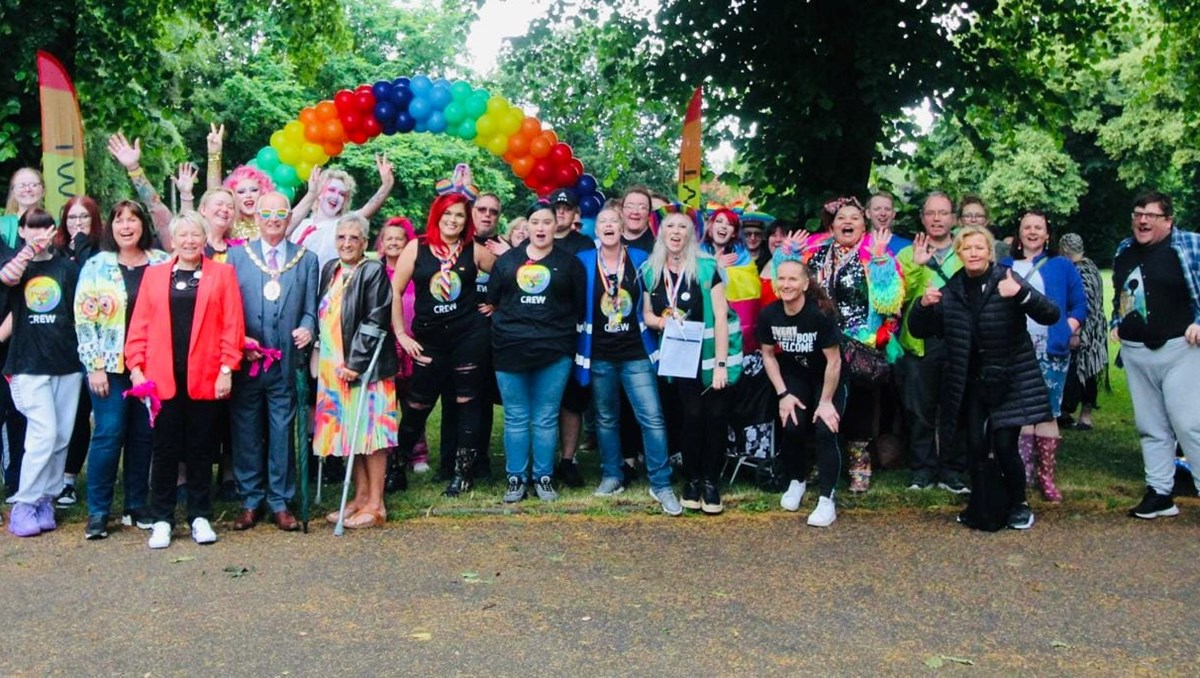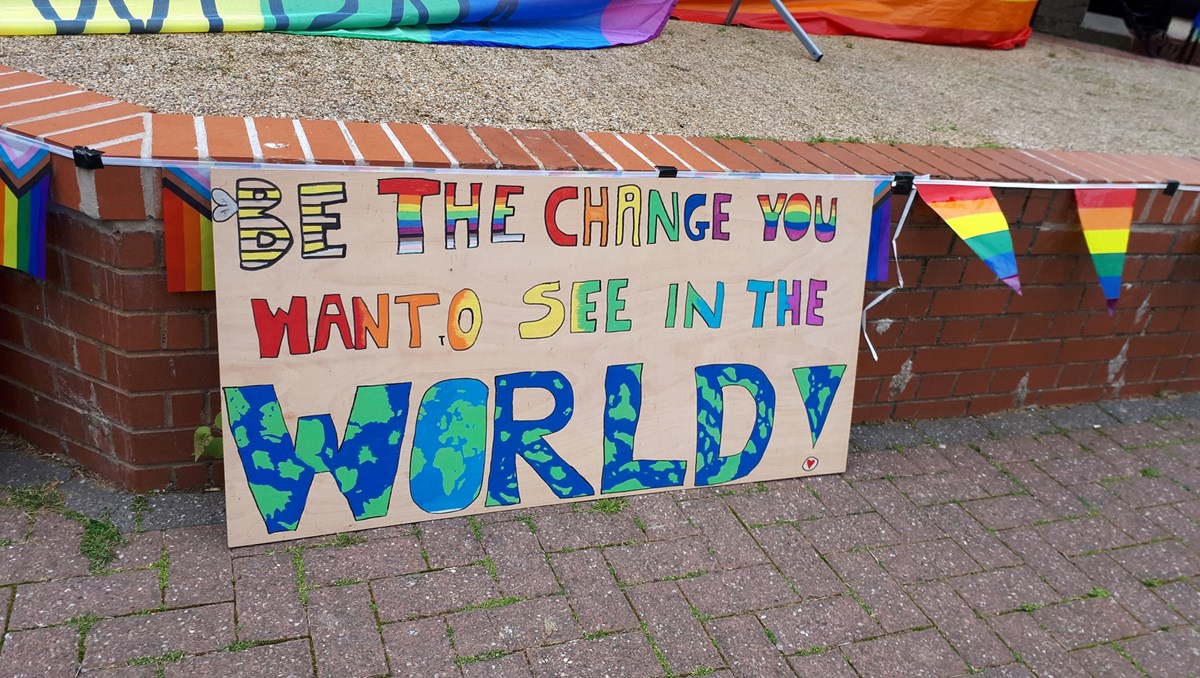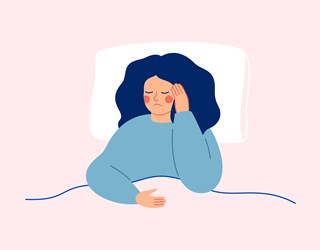Volunteering during the school holidays: a different type of rest?
In this blog, teacher Becks talks about how setting up a local Pride event and volunteering during the school holidays helps support their mental health and wellbeing.
Articles / 4 mins read

I founded my local Pride event ‘Nuneaton Pride’ because of my passion for equality and equity for the LGBTI+ community and due to my own experience of prejudice and discrimination. I am proud to say it is making a tangible difference to the LGBTI+ community and allies of Nuneaton, Bedworth and North Warwickshire; and it is growing, developing and thriving!
It is safe to say, however, that volunteering wasn’t my first choice of activity when seeking to support my mental wellbeing, especially as a full-time (exhausted) teacher. I think if someone had ‘suggested’ or ‘recommended’ volunteering as unsolicited advice, I would have treated it in the same way that I treat unsolicited advice about my small human!
As a full-time teacher who rarely has breathing space to think properly, let alone feed and clothe myself (as well as I would like), I usually have barely a moment to spare. Yet volunteering has taught me so much about myself and life.
Benefits of volunteering
When I ask “why on earth am I doing this?” (in those often challenging times), my brain cannot answer for the money, because it simply doesn’t exist. I’m not getting an MBE for this or a Damehood, and I’m not about to appear on ‘The Pride of Britain Awards’ and shake hands with Ant and Dec! It’s because I want to support people, prevent and reduce harm and suffering. Which makes me feel like the world is at least 0.001% better for what I do within it. I think that this is at the crux of how volunteering supports mental health and wellbeing, and gives you such a balance on life.
Numerous pieces of medical research and articles describe the positive effects of volunteering on mental and even physical health. Benefits include the reduction of stress; gaining life purpose and meaning; a wider or stronger social support network; and improving general wellbeing. Research documents this positive effect and advocate for the social prescribing of volunteering. There is also evidence that people become “more and more happier over time” when volunteering. All in all, the evidence is wide ranging and copious, but it usually helps if it is something that you ‘want’ to do and are passionate about.
My volunteering life is the life I CHOOSE rather than the life I am obliged to, need to, have to, or must live.
Finding the right balance
I used to keep myself over-the-top busy, so that I didn’t have to deal with parts of my life that I didn’t really want to deal with. I am much better at recognising this, these days; and much better notice and observe when I might be leaning towards burnout; so that I’m not using volunteering to avoid having to deal with something difficult. So it can sometimes help to take a step back and ask yourself ‘what type of rest does my body need right now?’
It can help to remember that rest can look different for different people – and you may need different types of rest at different times! In fact, researcher and author Dr Daulton-Smith believes there are seven types of rest, which all serve a unique purpose.
As the end of term approaches, you may be considering how you will make the most of your time to rest and recuperate from the busy academic year (you may like to do nothing more than read a book on the beach!). However, a useful tool that can give you snapshot of your life and how much time you are spending on different types of rest is the ‘Wheel of Life’. Commonly used by professional coaches, it helps you consider each area of your life in turn and assess what’s off balance. And so, it helps you identify areas that need more attention. An editable version can be found here.

My volunteering life is the life I CHOOSE rather than the life I am obliged to, need to, have to, or must live. I’ve never opted out, but I COULD if I wanted to as I have agency. Knowing that I have freedom over my own autonomy, and feeling that, is empowering. It is also infectious in the best possible way, as like thousands or even millions before me, I am finding that where I walk, I find so many others walking, and others join in, that walk together. Like my mantra for Nuneaton Pride, STRONGER TOGETHER.
Support over the summer
If you are looking for other practical tips on different ways to rest and recuperate over the summer break then check out Education Support’s free wellbeing resources, including their latest webinar ‘Rest up and reclaim your joy: reflecting on your academic year. You can also help them to support teachers and education in lots of ways: by donating, or signing up to the newsletter.
Finally, don’t forget, Education Support provide a free and confidential helpline (including over the summer break). You can call them 24/7 for emotional support on: 08000 562 561
Sources
- Exploring the Effects of Volunteering on the Social, Mental, and Physical Health and Well-being of Volunteers: An Umbrella Review
- Association of volunteering with mental well-being: a lifecourse analysis of a national population-based longitudinal study in the UK
- Does Volunteering Make Us Happier, or Are Happier People More Likely to Volunteer? Addressing the Problem of Reverse Causality When Estimating the Wellbeing Impacts of Volunteering.J Happiness Stud 22, 599–624 (2021), Lawton, R.N., Gramatki, I., Watt, W. et al
Don’t wait for a crisis to call.
We’ll offer you immediate, emotional support.
08000 562 561

Sign up to our newsletter for the latest mental heath and wellbeing resources, news and events straight to your inbox.





















